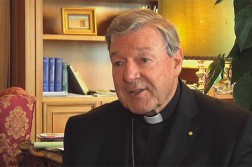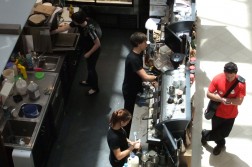So this is what it’s like when Caesar dies.
Well, not Caesar. The guy just below Caesar. Brutus, or Pompey, or Asterix. Someone like that. This is what it’s like when the guy who really really wanted to be Caesar but wasn’t quite good enough dies. Or rather, this is what it’s like when the guy who really wanted to be Caesar leaves Rome and lives out the rest of his life on a $176,000 pension writing snarky newspaper articles.
To think that soon we will never more see Peter Costello stalking the halls of power, pulling the levers of government, rinsing out the stables of fiscal policy. It truly is a momentous and historical time in Australian political life, an era so important — ending in such a significant way — that it makes last year’s retirement of Alexander Downer seem in retrospect even more uninteresting and irrelevant to everyone’s lives than it did at the time.
Australia’s longest-serving treasurer. The man who steered the economy for 11 long years, and sat on the backbench irritating everyone for approximately 43 more, is gone, never having achieved his ultimate goal of dissolving Parliament and ruling us all with an iron fist from his misty mountain lair.
As always at these times, one feels the need to reflect upon an extraordinary man, and extraordinary life, one that not only impacted upon the immediate political hurly-burly, but came to change the whole way we think about politics, economics, failure to gain promotion, and self-congratulatory memoirs.
Just what will be Costello’s legacy to the Australian people? Like all issues that people have to write lengthy articles on, it is not a simple matter. When determining whether his stay in Parliament was, on the whole, a boon to the nation that allowed the full flowering of Australian potential or a disastrous epoch rivalled only by the fall of Singapore in terms of the bringing of human misery, it is necessary to weigh and balance both Costello’s achievements and his enormous glaring flaws. We must consider the paying off of national debt against the widening divide between rich and poor; the record surpluses against the failure to invest in critical infrastructure; the reduction of unemployment against that creepy smile that made him look like he was waiting for the pills he slipped into your drink to take effect.
Of course, an understanding of any great man is dependent on an understanding of his background. In Costello’s case, his ideology was shaped by his devout Christian parents, who instilled in him a strong belief in Jesus’s desire for a deregulated labour market. Interestingly, where Christianity led Peter Costello into politics, the same upbringing and faith compelled his brother Tim to pursue a career in making people feel guilty for enjoying their lives. Not that this was the first instance of diverging careers within one family; history is full of famous siblings, one good and one evil — although obviously in this case there is not so much variety.
In his life before Parliament, Costello was active in student politics, where, according to Wikipedia, he "was punched by a rival student politician" — just one example of how life was better in the 70s. After university, like all kind-hearted folk, he became a lawyer. However, despite the glamour and adrenalin rush of industrial law, Costello felt he was destined for greater things, and to fill in time before they came along, he entered federal Parliament.
And in many ways, it was his time in federal Parliament that was the most important period in his life. Because despite the undeniable formative influences of parents, religion, and being punched in the face, the fate of Peter Costello will always be bound up inextricably with John Howard, the man who, with Costello’s help, ascended to the top of the political tree, and who, upon hearing of his ex-deputy’s retirement, was reported to have stated tersely, "I wish Peter well, but I have no further statement"; reporters having chosen to discreetly ignore Howard’s subsequent profanity-laced tirade and obscene physical gestures.
Because it is true that the Howard-Costello relationship was not all smooth sailing in the same way that Idi Amin was not all cuddles. The source of the tension between them was a promise Howard made before he became PM, that he would at some point stand aside for Costello to have his turn. Costello resented the fact that Howard never actually did this, while Howard, quite naturally, resented the fact that Costello remembered it.
And so, despite the pair forming one of the most formidable political partnerships in modern Australian history, we observed the tragedy of a friendship being soured beyond repair by such a petty thing as one man’s failure to honour his promise to another man to override the democratic process. And likewise, the Liberal Party itself was rent asunder, members having to make a heartbreaking choice between supporting their pathological liar leader, or their whiny, grasping deputy leader. The choice between blatant dishonesty and an overweeningly arrogant sense of self-entitlement is of course a common one for any Liberal, but that doesn’t mean it’s easy.
Of course, in part the reason that Costello never led the Liberal Party is that he never technically challenged the leader, and it is true that historically Australian prime ministers have been picked almost exclusively from the ranks of people who have tried to become prime minister. On the other hand, some say that he couldn’t have challenged Howard, because he didn’t have the numbers. But I don’t see how that makes a difference. He didn’t have the numbers in the electorate either. If you’re willing to be prime minister without getting the public to vote for you, it’s just lily-livered sissiness to let the fact your colleagues won’t vote for you either stand in your way.
Look at Julia Gillard. She clearly has ambition. She clearly wants to be prime minister. She clearly hates Kevin Rudd as much as we all do. But she doesn’t go around moping in a big Costello-esque funk, worrying about numbers and opportune moments and broken promises. No, she simply gets on with the job quietly and efficiently, secure in the knowledge that sometime in late 2010, her gradual campaign of incremental arsenic poisoning will take effect and Rudd will slump face-first into his minestrone. Frankly, Costello’s greatest problem was always his failure to be more like Julia Gillard. Although most people assumed this applied mostly to his sexual attractiveness, his squeamishness around murder is also a factor.
But look, let’s not dwell on the negatives too much. In the end, the political demise of Peter Costello is a cause for reflection, celebration and hollow, mirthless laughter. He wasn’t perfect, but he did preside over an unprecedented period of economic growth, which as far as I know is a pretty good thing.
The only question is, what next? Certainly the business world is an option. As a 52-year-old with experience in both law and politics, he is sure to be in high demand from any of the high-profile Australian companies who are looking for middle-aged people with no corporate background. Then there is his journalistic career. Readers of the Fairfax media have of late been enormously entertained and informed by his scholarly opinion pieces on a wide range of subjects: the Government’s shortcomings; his own superb record as treasurer; the economic problems of the country; what a good treasurer he was; the social quandaries facing our civilisation; how much better things were when he was treasurer; and so forth. He’s even dabbled in film criticism, and anyone who read his review of Baz Luhrmann’s Australia would agree with me when I say there is a fairly good chance that he saw it.
There is even a chance that he may work for the Rudd Government in an international role, given that the current PM is always on the lookout for talented and respected political opponents to send overseas.
But whatever the future holds for Peter Howard Costello, you can be sure that it will be as exciting and memorable and just as full of deep religiosity and savage verbal abuse as his life always has been.
Because if the last 30 years have taught us anything, it’s that when Peter Costello puts his mind to something, he is sure to achieve a level of success quite close to, but not quite reaching, the very best.
Ah yes, the career of Costello serves to illustrate how true it is that some are born great, some achieve greatness, and some become Australia’s longest-serving treasurer while waiting for someone else to thrust greatness upon them.
Donate To New Matilda
New Matilda is a small, independent media outlet. We survive through reader contributions, and never losing a lawsuit. If you got something from this article, giving something back helps us to continue speaking truth to power. Every little bit counts.



